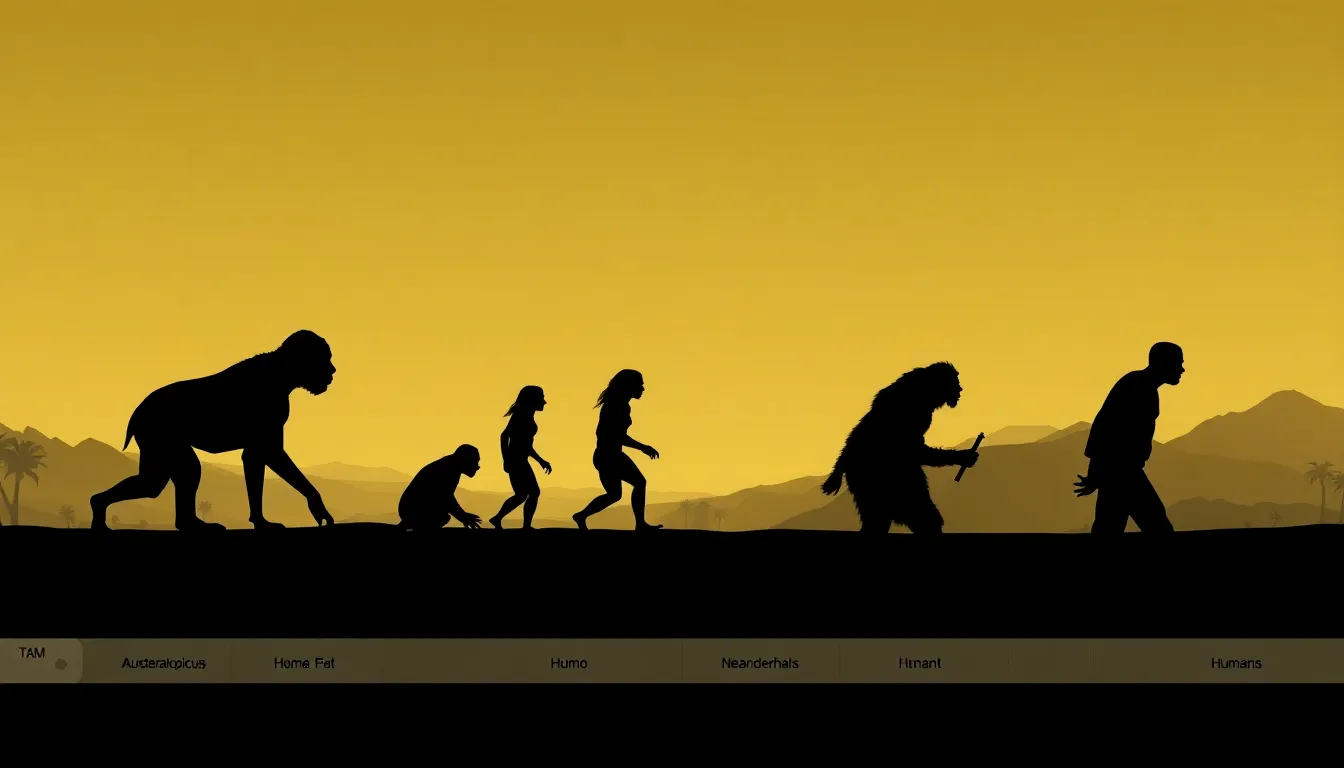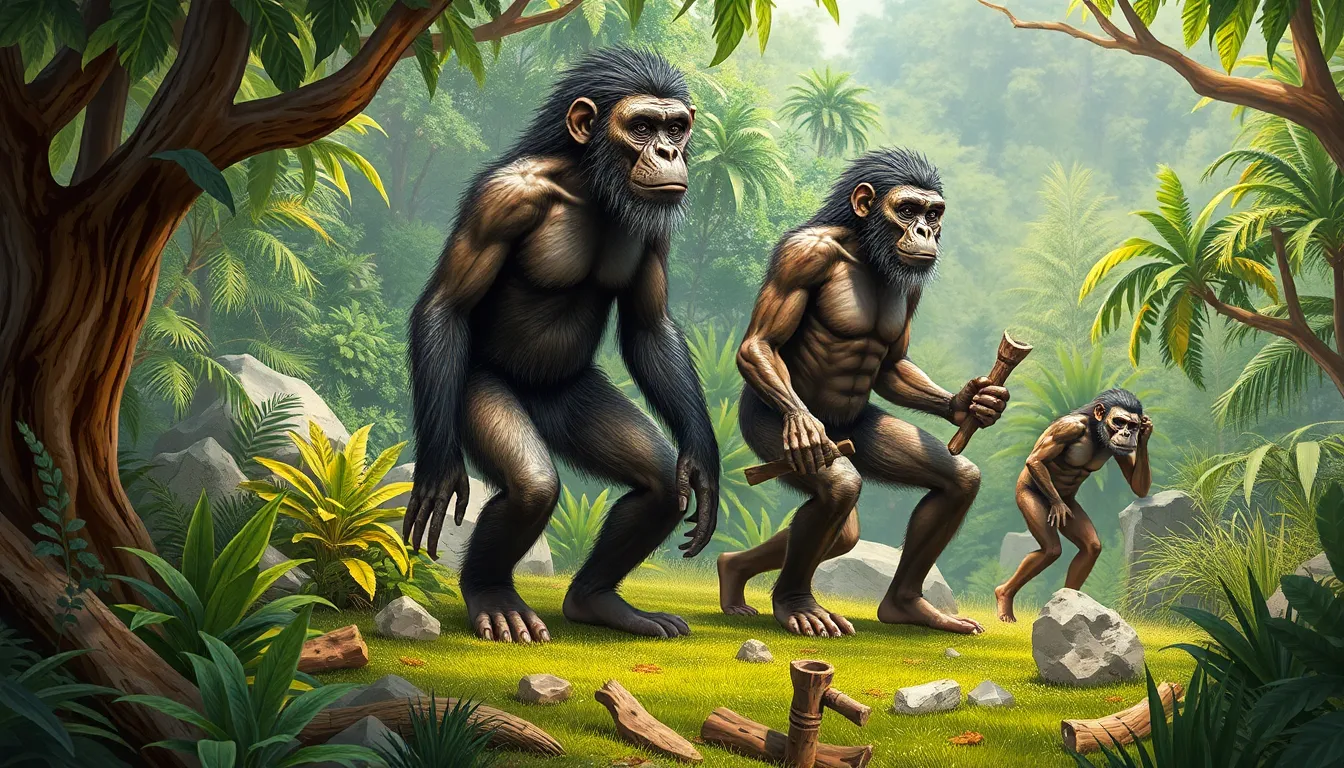As humans, we’ve come a long way from swinging in trees to swiping on smartphones. But what does the future hold for our species? With rapid advancements in technology and changing environments, the next chapter in human evolution could be as wild as a sci-fi movie. Imagine a world where people sport enhanced abilities, or perhaps, where we finally get that sixth toe everyone’s been secretly wishing for.
Table of Contents
ToggleOverview of Human Evolution
Human evolution represents a complex journey spanning millions of years. This journey begins with early primates, transitioning into hominins and ultimately, modern humans, known as Homo sapiens. Fossils and archaeological findings reveal a gradual development of cognitive skills and physical attributes, showcasing adaptation to diverse environments.
The discovery of Australopithecus afarensis, dating back around 3.2 million years, highlights bipedalism as a significant milestone. Such adaptations paved the way for tools and social structures, which enhanced survival rates. Homo habilis followed, showcasing increased brain size and tool usage, indicating a shift towards more complex behaviors.
Neanderthals, existing approximately 400,000 to 40,000 years ago, illustrate another significant branch in human evolution. Their adaptation to harsh climates and collaboration in hunting demonstrate advanced social interactions. Genetic studies indicate that modern humans share about 1-2% of their DNA with Neanderthals, affirming interbreeding events during their coexistence.
Future predictions may suggest continued evolution influenced by environment and technology. Genetic modifications and artificial intelligence could reshape humanity. Enhanced cognitive abilities, improved physical traits, or even entirely new adaptations may occur as society progresses.
Understanding human evolution involves recognizing both biological and cultural factors. Cultural evolution, through advancements in language and technology, complements biological changes. As society adapts, the interplay between biology and culture will shape the future of humanity. Each evolutionary step reinforces the adaptability ingrained within the human species, preparing it for challenges ahead.
Current Understanding of Human Evolution


Human evolution represents an intricate journey shaped by various factors over millions of years. Understanding this history reveals how species adapted to survive and thrive in changing environments.
Key Stages in Evolution
Key milestones mark the path from early primates to modern humans. Australopithecus afarensis is notable for its bipedalism, which laid the foundation for walking upright. Homo habilis followed, showcasing increased brain size and the development of tools. Neanderthals, alongside modern humans, shared advanced social structures and skills, creating significant cultural connections. These stages emphasize the dynamic nature of evolution as it responds to environmental pressures.
Factors Influencing Evolution
Environmental factors significantly shape human evolution. Climate changes impact geographical distributions, prompting adaptive traits for survival. Technological advancements also play a role, influencing how humans interact with their surroundings. Genetic mutations contribute variations, some case enhancements in physical or cognitive abilities. Cultural evolution, through shared knowledge and practices, drives social dynamics that affect reproductive success, further steering the evolutionary process. Overall, multiple interconnected elements shape the trajectory of human development.
Predictions for Future Evolution
Human evolution may undergo transformative changes driven by advancements in science and technology. Predictions suggest that significant developments could reshape physical and cognitive traits.
Genetic Engineering and Its Impact
Genetic engineering may offer unprecedented opportunities for enhancing human capabilities. Potential applications include increasing resistance to diseases, enhancing intelligence, and improving physical attributes. CRISPR technology, for instance, enables precise edits to DNA, allowing for targeted improvements. Ethical considerations will guide the responsible use of these powerful tools. Current research indicates that genes linked to lifespan and health could become prime targets for modification. Enhanced genetic traits may define future generations, ultimately shifting human evolution in remarkable ways.
Environmental Changes and Human Adaptation
Environmental changes drive adaptation in human populations. Climate shifts may force communities to develop new survival strategies. For example, rising sea levels could lead to more coastal adaptations among populations. Changes in diet may occur as people adapt to different ecosystems. Additionally, extreme weather patterns may promote traits that enhance resilience, such as improved tolerance to heat. Understanding these dynamics highlights how humans will continue to evolve under emerging environmental pressures. Adaptive behaviors and physiological changes will play vital roles in future human evolution.
The Role of Technology in Human Evolution
Technology rapidly transforms human evolution, reshaping capabilities and traits. The integration of advanced tools influences physical and cognitive functions directly.
Artificial Intelligence and Human Development
Artificial intelligence plays a pivotal role in enhancing human development. It augments decision-making processes through data analysis and predictive modeling. AI algorithms assist in identifying patterns, improving education methods, and tailoring health care to individual needs. They help diagnose conditions earlier, contributing to increased life expectancy. Furthermore, AI-driven innovations foster collaboration among researchers, accelerating discoveries in fields like genetics. The potential for AI to augment human intelligence and emotional understanding remains a crucial consideration in shaping future evolution.
Biotechnology Innovations
Biotechnology innovations significantly impact human evolutionary pathways. Techniques like CRISPR enable targeted genetic modifications, enhancing resilience against diseases. As a result, traits that support survival and adaptability may flourish. Advanced stem cell research offers potential solutions for regenerative medicine, restoring damaged tissues and organs. Developments in synthetic biology also pave the way for creating organisms with beneficial properties, impacting food security and environmental sustainability. These innovations reflect a growing intersection between biological sciences and technology, fundamentally altering how humans may evolve in response to challenges.
Ethical Considerations in Evolution Predictions
Ethical considerations arise when predicting the future of human evolution. Implications of genetic engineering, particularly through technologies like CRISPR, present significant moral dilemmas. Manipulating human genetics raises questions about consent, especially for generations not yet born.
Social justice issues become apparent when considering access to advanced technologies. Disparities in genetic enhancements could exacerbate existing inequalities among populations, potentially leading to a division between genetically modified individuals and those who remain unaltered.
Legislation regarding genetic manipulation must evolve alongside technological capabilities. Policymakers should prioritize guidelines that ensure equitable access and safeguard against misuse.
Environmental impacts of evolutionary predictions cannot be ignored. Climate change necessitates adaptations, but ethical implications arise regarding how these changes influence vulnerable populations. Ensuring their voices participate in discussions about adaptation strategies becomes critical.
Cultural evolution also plays a role in shaping ethical frameworks. As societies navigate the implications of advanced technologies, traditional values and beliefs may conflict with new enhancements. Open dialogues within communities could establish consensus on acceptable practices in genetic engineering.
Long-term consequences of human modifications pose additional ethical challenges. Predicting outcomes of genetic changes is inherently uncertain. Researchers must balance innovation with caution, acknowledging potential risks tied to unforeseen effects on human health or societal structures.
Respectful collaboration among scientists, ethicists, and policymakers will strengthen the development of ethical guidelines. Transparency in research processes and open engagement with the public will reinforce trust in the ongoing discussion on human evolution and technological advancements.
The future of human evolution stands at a fascinating crossroads. As technology advances and environmental pressures shift, the potential for enhanced human capabilities becomes increasingly tangible. The interplay between genetic engineering and cultural evolution will undoubtedly shape the trajectory of humanity in unprecedented ways.
Ethical considerations will play a crucial role in guiding these developments. Ensuring equitable access to advancements will be vital in preventing societal inequalities. As humanity navigates this complex landscape, collaboration among scientists, ethicists, and policymakers will be essential.
Ultimately, the journey of human evolution is far from over. With the right approach, future generations may thrive in ways that were once confined to the realm of imagination.

